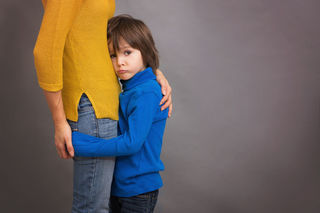Parenting
How We Can Predict a Kid's Future
Infant temperament predicts adult personality, with implications for parenting.
Posted April 28, 2020 Reviewed by Kaja Perina
I used to think that parenting is what makes kids the way they are, until I had more than one child! –Seen on a coffee mug.
A research study, funded by the National Institutes of Health, confirms what parents have always intuitively known. Kids come pre-loaded with some of their personality, straight from the box.
This long-term, longitudinal study was the first of its kind to demonstrate that infant personality at 14 months predicts an introverted, reserved personality at age 26. While temperament research has long posited that child temperament predicts adult personality, this study covered a much longer developmental span. In addition, this study was unique in that it used objective rating of infant temperament, rather than maternal observation, to make its predictions. This study also examined neuropsychological correlates that may explain how infant behavioral inhibition turns into adolescent struggles, which in turn can predict adult psychopathology.
What is temperament? It’s a “consistent reaction style that a child demonstrates across a variety of settings and situations, particularly those involving stress or change,” explains Sandee McClowry, a professor of psychology and education at New York University. She believes that understanding a child’s temperament can help you be a better parent.

Research Design
If you want to know an infant’s temperament, stress them out. Our temperament is most easily evident in situations of stress, unfamiliarity, or threat. In the current study, researchers stressed the 14-month-old babies by placing them in an unfamiliar playroom for free play time, exposing them to an unfamiliar adult, and exposing them to a novel toy robot. In order to assess inhibition, researchers observed and coded how long it took for an infant to leave the security of mom’s lap and explore the room. How long did it take for the child to interact with the stranger, or touch the unfamiliar toy, for example? While most children will eventually warm up to a strange situation, inhibited children take much longer.
At age 15, participants engaged in the flanker task. (You can try a flanker task by clicking here.) The task asks participants to respond in a specific way to specific symbols. The potential for error is high, as the task is both boring and challenging. As they took the flanker task, participants were assessed via EEG to rate their reaction to making an error. The goal was to see how error sensitive participants were. How reactive were they to making errors?
At age 26, participants were assessed via a variety of self-report measures, as well as questionnaires regarding demographic data, such as relationship status, parenting status, or career attainment. Participants were asked about shyness and sociability, daily functioning among family and friends, loneliness, life satisfaction, and sense of competency in social situations. Finally, they were asked to complete an adult psychopathology scale.
Temperament: Prediction, Prognosis, or Platform?
A major limitation of the study was that the researchers focused on inter-individual differences. They didn’t track the same person over time. Instead, they looked at trends and tendencies among the group as a whole. A study that traces the development of inhibition within the same person (intra-individual differences) might give us more information about how inhibition can turn into being a reserved adult, or how inhibition can lead to social anxiety and other adult psychopathology.
What’s more interesting in this study is not what it found, but what it didn’t find. Earlier research established that inhibited infants are at a 4-6% risk for developing anxiety disorders, but only 40% of them develop these disorders.
Similarly, adolescents who were more reactive towards error on the flanker task were more likely to develop psychopathology in adulthood. Our brains have an error-monitoring system. The job of that system is simply to provide information—“Oh, shoot! I messed up.” Some people have what is called an over-reactive error monitoring network. They demonstrate a high level of error-related negativity. High levels of error-related negativity are associated with anxiety disorders. Low levels of error-related negativity are associated with impulsivity.
That makes conceptual sense, right? For some teens, the sensation of making an error is so aversive, they become wary of making errors in the future. We can see how that would interact with anxiety or social anxiety, as well as future career attainment or romantic involvement. It’s also easy to understand that too little error-related negativity can lead to some impulsive choices.
However, only a small subset of the inhibited adolescents demonstrated an over-recruitment of the error-monitoring system, suggesting that many inhibited children learn to control their error-related negativity. The adolescents that don’t learn to control their error-related negativity are at greater risk for adult internalizing psychopathology, but it’s not a direct prognosis. That suggests that intervention is possible. (For more about how to parent anxious children, click here. For more on social anxiety disorder, click here.)
This finding tells us that while temperament is quite influential, it does not create a direct prognosis for future functioning or mental health. That’s where parenting comes in.
Parenting and Temperament
Obviously, children are not raised in a bubble. There’s a transaction between parenting and temperament. The child’s temperament can interact with the parent’s parenting style to further reinforce certain patterns. If a child tends to withdraw, and the parent encourages that withdrawal, the child will learn to withdraw even more. The child might think “I’m scared, and Mommy seems to agree that this is scary. I’ll stay home and not venture out.” This prevents the child from learning a competing reality—“Wow, I was scared to meet new kids, but turns out, they’re nicer than I thought. I guess I should try to meet more new kids.”
Temperament based parenting allows parents to acknowledge that children are born with their temperaments, and that temperament can be a self-fulfilling lens—if the world looks scary, and I don’t venture out into it, I’ll never learn if it is really scary or not. But it’s not enough to know what a child’s inborn patterns are. The next goal is to gently stretch the child so that they can learn to control their instinctive responses.
A child with an overreactive error-monitoring system can be taught to intentionally mess up, and that it’s OK to make mistakes. A child who is naturally afraid to explore can be gently and supportively exposed to new experiences. Children who are shy can learn social skills, can practice those skills, and can be encouraged for their bravery. (For more on hacking a child's challenges into superpowers, click here. For more ways to help anxious children, click here.)
As McClowry says, we want to demonstrate acceptance and progression. We accept the child’s temperament as it is, and we also want to help the child learn new skills and progress. So yes, your child’s temperament can certainly predict a lot—but that doesn’t mean it’s a prison. Instead, view it as a platform to build upon.
© Robyn Koslowitz, 2020
References
Tang, A., Crawford, H., Morales, S., Degnan, K. A., Pine, D. S., & Fox, N. A. (2020). Infant behavioral inhibition predicts personality and social outcomes three decades later. Proceedings of the National Academy of Sciences.
J. A. Clauss, J. U. Blackford, Behavioral inhibition and risk for developing social anxiety disorder: A meta-analytic study. J. Am. Acad. Child Adolesc. Psychiatry 51, 1066–1075.e1 (2012)
McClowry SG. Your child's unique temperament: Insights and strategies for responsive parenting. Research Press; Champaign, IL: 2003.




